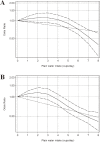Plain Water Intake and Association With the Risk of Overweight in the Chinese Adult Population: China Health and Nutrition Survey 2006-2011
- PMID: 30880306
- PMCID: PMC7025921
- DOI: 10.2188/jea.JE20180223
Plain Water Intake and Association With the Risk of Overweight in the Chinese Adult Population: China Health and Nutrition Survey 2006-2011
Abstract
Background: The prevalence of overweight is increasing dramatically worldwide. The aim of our study was to investigate the association of plain water intake (PWI) with the risk of new-onset overweight risk among Chinese adults.
Methods: A total of 3,200 adults aged 18-65 who were free of overweight at baseline were enrolled from China Health and Nutrition Survey (CHNS) cohort study in 2006-2011. The risk of new-onset overweight with different amounts of PWI per day was analyzed in this 5-year cohort. A multiple logistic regression model was used to assess the association of PWI and the risk of new-onset overweight and adjust for potential confounders. Moreover, dose-response models were developed to estimate the linear relationship.
Results: During 5 years of follow-up, 1,018 incident cases were identified. Our analysis indicated an inverse association of more than 4 cups of PWI per day and the risk of new-onset overweight among normal weight individuals. Compared with participants who drank 2 to 3 cups PWI, the adjusted odds ratios (OR) of overweight were 0.741 (95% confidence interval [CI], 0.599-0.916) in participants who drank 4 to 5 cups PWI, and 0.547 (95% CI, 0.435-0.687) in participants who drank more than 6 cups PWI. The dose-response analysis showed that every cup of PWI was associated with a 6.5% and 8.4% decrease in the risk of new-onset overweight among men and women, respectively. The interactions of PWI and covariates on the risk of overweight were not found.
Conclusion: Drinking more than 4 cups (≈1 liter) per day of plain water is associated with decrease in the risk of new-onset overweight among normal-weight individuals.
Keywords: CHNS; dose–response; obesity; overweight; plain water.
Figures



Similar articles
-
Association between plain water intake and risk of hypertension: longitudinal analyses from the China Health and Nutrition Survey.Front Public Health. 2024 Jan 9;11:1280653. doi: 10.3389/fpubh.2023.1280653. eCollection 2023. Front Public Health. 2024. PMID: 38269373 Free PMC article.
-
Higher plain water intake is related to lower newly diagnosed nonalcoholic fatty liver disease risk: a population-based study.Eur J Clin Nutr. 2021 Dec;75(12):1801-1808. doi: 10.1038/s41430-021-00891-9. Epub 2021 Apr 9. Eur J Clin Nutr. 2021. PMID: 33837275
-
[Study on the multilevel and longitudinal association between red meat consumption and changes in body mass index, body weight and risk of incident overweight among Chinese adults].Zhonghua Liu Xing Bing Xue Za Zhi. 2013 Jul;34(7):661-7. Zhonghua Liu Xing Bing Xue Za Zhi. 2013. PMID: 24257164 Chinese.
-
Consumption of monosodium glutamate in relation to incidence of overweight in Chinese adults: China Health and Nutrition Survey (CHNS).Am J Clin Nutr. 2011 Jun;93(6):1328-36. doi: 10.3945/ajcn.110.008870. Epub 2011 Apr 6. Am J Clin Nutr. 2011. PMID: 21471280 Free PMC article.
-
The association of fruit and vegetable consumption with changes in weight and body mass index in Chinese adults: a cohort study.Public Health. 2018 Apr;157:121-126. doi: 10.1016/j.puhe.2018.01.027. Epub 2018 Mar 20. Public Health. 2018. PMID: 29524810
Cited by
-
Sociodemographic, lifestyle, behavioral, and parental factors associated with sugar-sweetened beverage consumption in children in China.PLoS One. 2021 Dec 10;16(12):e0261199. doi: 10.1371/journal.pone.0261199. eCollection 2021. PLoS One. 2021. PMID: 34890424 Free PMC article.
-
Water and Beverages Intake Among Workers Amid the COVID-19 Pandemic in Indonesia.Front Nutr. 2022 Mar 14;9:832641. doi: 10.3389/fnut.2022.832641. eCollection 2022. Front Nutr. 2022. PMID: 35369071 Free PMC article.
-
Prevalence of overweight and obesity and their associated factors among health sciences college students, Saudi Arabia.J Family Med Prim Care. 2021 Feb;10(2):961-967. doi: 10.4103/jfmpc.jfmpc_1749_20. Epub 2021 Feb 27. J Family Med Prim Care. 2021. PMID: 34041105 Free PMC article.
-
Determinants of self-rated health among an older Tibetan population in a Chinese plateau area: analysis based on the conceptual framework for determinants of health.BMC Public Health. 2021 Mar 11;21(1):489. doi: 10.1186/s12889-021-10359-x. BMC Public Health. 2021. PMID: 33706725 Free PMC article.
-
Association of plain water intake with risk of all-cause and cause-specific mortality in individuals with non-alcoholic fatty liver disease or metabolic dysfunction-associated steatotic liver disease.Front Nutr. 2024 Oct 30;11:1478194. doi: 10.3389/fnut.2024.1478194. eCollection 2024. Front Nutr. 2024. PMID: 39539374 Free PMC article.

